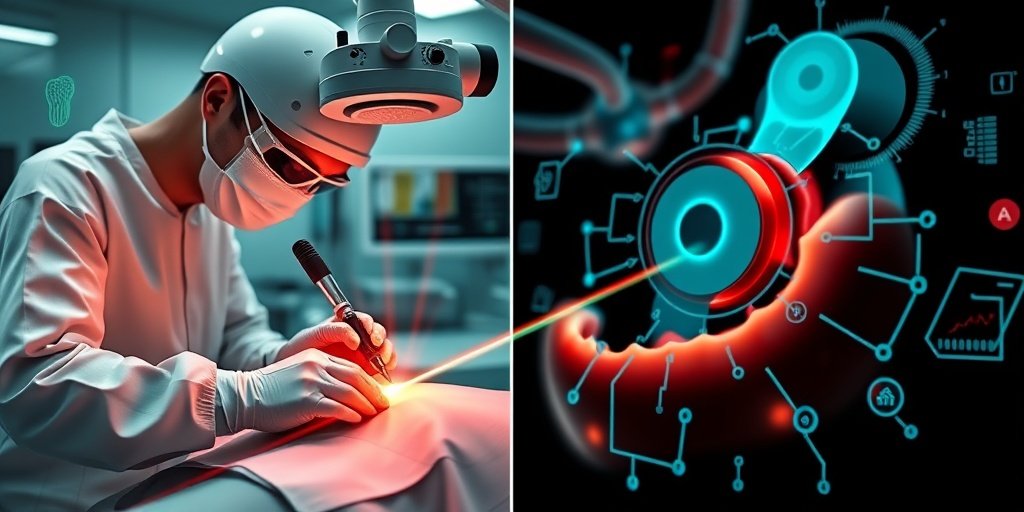⚡ Quick Summary
This narrative review explores the role of Artificial Intelligence (AI) in enhancing the precision and safety of laser-assisted oral surgery. The findings indicate that AI technologies can significantly improve surgical outcomes, with systems like CARLO® achieving an impressive 96% accuracy in osteotomy procedures.
🔍 Key Details
- 📊 Focus: AI applications in laser-assisted oral surgery
- 🧩 Technologies evaluated: Machine learning, neural networks, robotics
- ⚙️ Emerging tools: AI-driven robotic systems, Optical Coherence Tomography, Raman Spectroscopy
- 🏆 Key performance metric: CARLO® system achieved 96% accuracy in osteotomy
🔑 Key Takeaways
- 🤖 AI technologies are being integrated into laser-assisted oral surgery to enhance precision and safety.
- 📈 The CARLO® system demonstrated osteotomy accuracy within 2 mm deviation in 96% of cases.
- 🔍 AI algorithms improved sensitivity in detecting oral lesions to over 94%.
- 💰 Challenges include high costs, fragmented data, and the need for clinical validation.
- ⚖️ Ethical concerns and regulatory uncertainties complicate the adoption of AI technologies.
- 🌍 Future research should focus on large-scale clinical validation and comprehensive regulatory frameworks.
- 🏥 Clinical significance lies in the potential to enhance surgical precision and optimize patient care.

📚 Background
The integration of AI technologies in healthcare is rapidly evolving, particularly in surgical fields. Laser-assisted oral surgery offers numerous advantages, such as reduced bleeding and faster recovery times. However, the effectiveness of these procedures heavily relies on precise calibration and execution. AI has the potential to address these challenges by optimizing surgical techniques and improving diagnostic accuracy.
🗒️ Study
This narrative review synthesizes existing literature on the application of AI in laser-assisted oral surgery. It evaluates various technologies, including machine learning, neural networks, and robotics, while also exploring emerging trends such as AI-driven robotic systems and advanced diagnostic tools like Optical Coherence Tomography and Raman Spectroscopy.
📈 Results
The review highlights that AI technologies can significantly enhance surgical precision and efficiency. For instance, the CARLO® system achieved an impressive osteotomy accuracy of 96% in a multicenter study. Furthermore, AI algorithms demonstrated a remarkable ability to improve the sensitivity of oral lesion detection to over 94%, surpassing traditional clinician-based assessments. However, challenges such as high costs and the need for robust clinical validation remain significant barriers to widespread adoption.
🌍 Impact and Implications
The findings from this review suggest that the integration of AI in laser-assisted oral surgery could revolutionize surgical practices. By enhancing precision and optimizing treatment outcomes, AI technologies have the potential to improve overall patient care. Addressing the existing challenges will be crucial for transforming surgical practices, making them more efficient and accessible for both clinicians and patients.
🔮 Conclusion
This narrative review underscores the transformative potential of AI in laser-assisted oral surgery. While the technology promises significant advancements in surgical precision and patient outcomes, it is essential to address the technical, ethical, and regulatory challenges that accompany its implementation. Future research should prioritize comprehensive clinical validation and the establishment of robust regulatory frameworks to ensure safe and effective integration of AI in surgical practices.
💬 Your comments
What are your thoughts on the integration of AI in oral surgery? Do you believe it can truly enhance surgical outcomes? Let’s start a conversation! 💬 Leave your thoughts in the comments below or connect with us on social media:
Artificial Intelligence for Laser-Assisted Oral Surgery: A Narrative Review of Current Trends and Future Perspectives.
Abstract
OBJECTIVES: Artificial intelligence (AI) technologies are increasingly being explored to optimize the precision, safety, and personalization of laser-assisted oral surgical procedures. While lasers offer significant advantages, their efficacy depends on precise calibration to avoid complications. This narrative review synthesizes the current and emerging applications of AI in enhancing both laser-assisted surgical execution and diagnostic imaging, while addressing the associated challenges.
METHODOLOGY: A comprehensive review of literature was conducted to evaluate the role of AI technologies, including machine learning, neural networks, and robotics, in laser-assisted oral surgery. Emerging trends such as the AI-driven robotic system and AI-enhanced diagnostic tools (e.g., Optical Coherence Tomography, Raman Spectroscopy) were evaluated. The review also examines challenges like fragmented dental data, high costs, clinical validation needs, ethical concerns, and automation bias.
RESULTS: AI technologies demonstrate significant promise in enhancing precision and efficiency. For example, the CARLO® system achieved osteotomy accuracy within 2 mm deviation in 96% of cases in a multicenter study. Diagnostically, AI algorithms improved sensitivity in detecting oral lesions to over 94%, outperforming traditional clinician-based assessment. However, barriers such as high costs, infrastructure requirements, and the need for robust clinical validation remain. Ethical and regulatory uncertainties further complicate adoption.
CONCLUSIONS: AI holds transformative potential in laser-assisted oral surgery, but addressing technical, ethical, and regulatory challenges is crucial. Future research should prioritize large-scale clinical validation, multi-center trials, and comprehensive regulatory frameworks to ensure safe and effective implementation.
CLINICAL SIGNIFICANCE: The integration of AI in laser-assisted oral surgery has the potential to significantly enhance surgical precision, optimize treatment outcomes, and improve overall patient care. Overcoming existing challenges may transform surgical practices, making them more efficient and accessible for clinicians and patients.
Author: [‘Sivaramakrishnan G’, ‘Sridharan K’]
Journal: J Dent
Citation: Sivaramakrishnan G and Sridharan K. Artificial Intelligence for Laser-Assisted Oral Surgery: A Narrative Review of Current Trends and Future Perspectives. Artificial Intelligence for Laser-Assisted Oral Surgery: A Narrative Review of Current Trends and Future Perspectives. 2025; (unknown volume):106202. doi: 10.1016/j.jdent.2025.106202